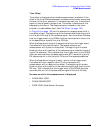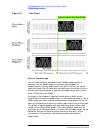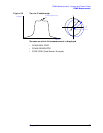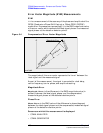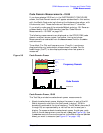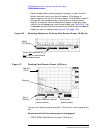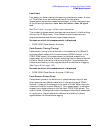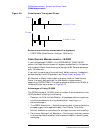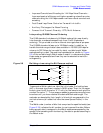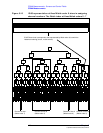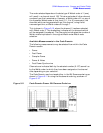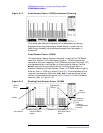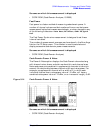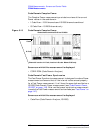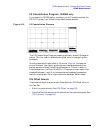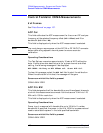
Chapter 5 143
CDMA Measurements - Screens and Control Fields
CDMA Measurements
• Improved Convolutional Encoding for 14.4 Kbps Voice Channels –
Improved spectral efficiency and higher spreading rates allow voice
channels using the 14.4 Kbps vocoder now have robust convolutional
encoding.
• Fast Closed Loop Power Control on Forward Link traffic.
• Auxiliary Pilot support for Beam Forming
• Forward Link Transmit Diversity - OTD, Multi-Antenna
Interpreting IS-2000 Channel Ordering
The IS-95 standard includes only 64 Walsh codes which map directly
into channels, numbered consecutively from 0 to 63 (Hadamard
ordering). This provided a uniform channel size regardless of purpose.
The IS-2000 standard allows up to 128 Walsh codes. In addition, to
handle the wide range of data rates available in IS-2000 (9.6 kbps for
voice up to 307.2 kbps for low mobility data), variable length Walsh
code spreading is used. The code tree representation, shown in Figure
5-9, of the variable length Walsh codes is useful in understanding how
these codes are generated and how they can be selected to maintain
orthogonality.
Figure 5-9 Building a tree using the Bit Reverse method
To generate a Walsh code tree, take the initial code, first add a place
(bit) in the most significant number’s (MSN) place. Then, for the upper
branch, give this bit the value “0”. Finally, for the lower branch give this
number the value “1”. This process proceeds to generate more and more
branches until you have reached the desired Walsh code length. The
code sets are denoted by their length in bits which corresponds to the
vertical columns (all codes that have the same Spread Factor) in the
tree.
The Walsh order (number of bits that comprises the specified code) (see
Figure 5-10) indicates the bit number to use to spread the data. Before
being spread, data is assigned to the Walsh codes encompassed by the
spread. After encoding and interleaving, the data is spread according to
the Walsh order.
0
0
1
00
10
01
11
000
100
010
110
001
101
011
111
(0)
(4)
(2)
(6)
(1)
(5)
(3)
(7)



